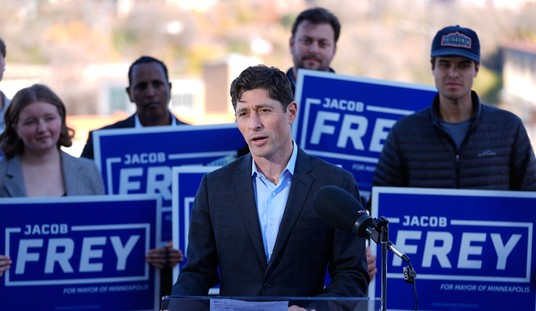You don’t have the balls, champ.
That procedure requires 51 votes rather than the 60 needed to prevent Republicans from blocking votes on President Barack Obama’s top legislative priorities. That supermajority is at risk as the Massachusetts race has tightened.
“Even before Massachusetts and that race was on the radar screen, we prepared for the process of using reconciliation,” Chris Van Hollen of Maryland, chairman of the Democratic Congressional Campaign Committee, said…
Should Democrats take that route, the legislation would have to be scaled back because of Senate rules.
Lefty poll analyst Nate Silver tackled this question in mid-December, when the idea of the GOP blowing up Massachusetts was just a glint in Scott Brown’s eye. Worth quoting:
The Bush tax cuts were popular; health care is not. Moreover, the filibuster actually polls well, so use of the procedure itself would be unpopular. If you intersect an unpopular policy with an unpopular process, I don’t know what you’re going to get, but the downside risk would seem to be fairly profound — as in, I’d take even money at that point that the Democrats would lose the House.
Also, tax cuts are a relatively straightforward application of the reconciliation process — health care is not, and the resulting procedural debate would last weeks if not months, giving the public plenty of time to stew over it.
He’s not even sure the Dems would have 51 votes guaranteed given that Blue Dogs like Nelson and Lincoln would certainly use the new threshold as their opportunity to bail on the plan. But never mind that: Considering the panic among vulnerable Democrats about the process dragging on much longer, Silver’s second stated reason is more compelling than his first. Factor in the new optics — i.e., Democrats short-circuiting normal Senate procedures to obstruct a guy who’d just been elected for the specific purpose of blocking the bill — and it’s a recipe for disaster. Frankly, I wouldn’t be surprised to see the caucus fracture over it. Barney Frank and Ed Schultz are exaggerating slightly for electoral effect in saying that a Brown win means the end of ObamaCare — but only slightly. As Lowry explains, it probably does mean the end, unless Nelson et al. have much sturdier spines than we’ve given them credit for.
While you mull, here’s some input from a guy who once enjoyed lecturing people about taking a hint when public support for their policies hits 35 percent.








Join the conversation as a VIP Member